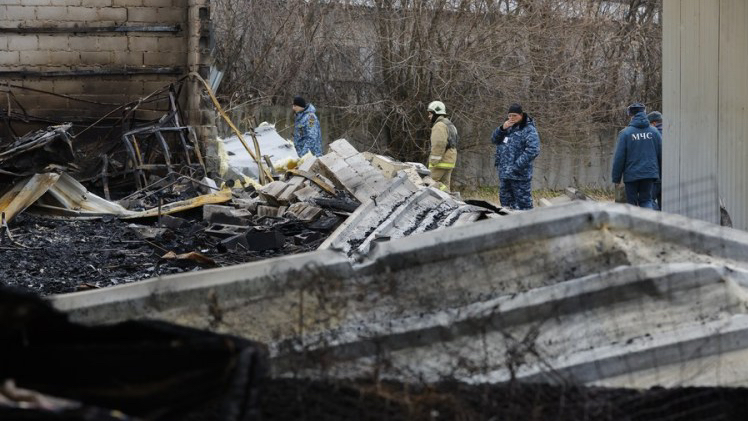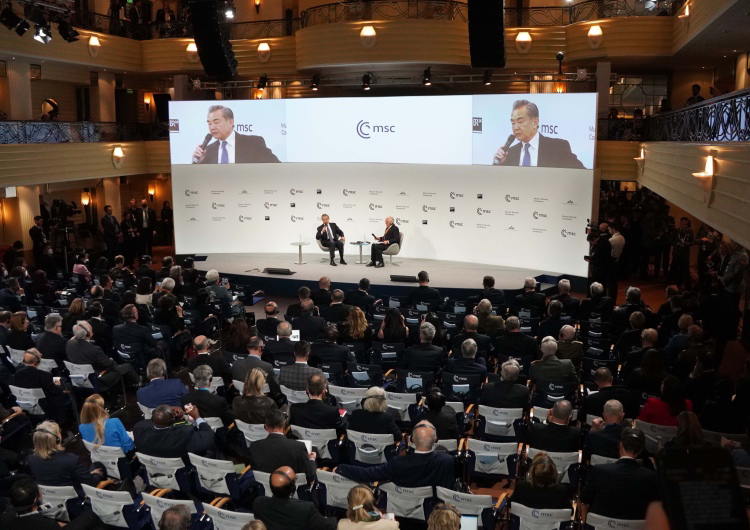
People inspect the aftermath of shelling of the city market in Donetsk, December 12, 2022. /Xinhua
People inspect the aftermath of shelling of the city market in Donetsk, December 12, 2022. /Xinhua
Editor's note: William Jones is a former White House correspondent for Executive Intelligence Review and a non-resident fellow of the Chongyang Institute for Financial Studies, Renmin University of China. The article reflects the author's opinions, and not necessarily those of CGTN.
As NATO delivers more weapons to Ukraine, many Western countries want to keep the conflict ongoing, despite causing many casualties, displacing numerous people, intensifying global energy and food shortages, as well as undermining regional and international security.
At the recent Munich Security Conference, country after country were pledging new commitments to deliver more powerful and far-reaching weapons to Ukraine. This has heightened the dangerous risk of a nuclear catastrophe. Russia stands committed not to use nuclear weapons in this conflict, but the Western mobilization in Ukraine could become a greater threat to Russia's sovereignty. Hence, the conflict could cross a red-line.
Accordingly, China has issued two documents, hoping to put the world back on the right path to peace. On February 21, Beijing released The Global Security Initiative Concept Paper to highlight its thinking on such matters, which was launched last year at the Boao Forum by Chinese President Xi Jinping.
On February 23, Beijing released China's Position on Political Settlement of the Ukraine Crisis. The paper was introduced by the director of the Office of the Foreign Affairs Commission of the Communist Party of China (CPC) Central Committee, Wang Yi at the Munich Security Conference, as he characterized it as a peace proposal. China has called for "indivisible security." The security interests of all the parties must be taken into consideration in regards to resolving a conflict. It's fundamental for any lasting peaceful resolution. The Peace of Westphalia in 1648, which ended over a century of religious wars in Europe, called this principle "the good of the other."
The parties should adopt a different view of their former opponent, in this case, abandoning the Cold War mentality. "All parties should following the vision of common, comprehensive, cooperative and sustainable security and supporting long-term peace and stability of the world to forge a balanced, effective and sustainable European security architecture," said the paper. This will be the most difficult task, since old attitudes, like old habits, are hard to change. Since the demise of the Soviet Union, the Western nations, particularly the Anglo-American contingent, believe they should remain the globalist "rule-makers." This was cast into a formal doctrine in the 1990s by the neo-conservative think-tank, Project for A New American Century, and has been followed up by our short-sighted political elites, both Republican and Democrat.

Wang Yi, a member of the Political Bureau of the Communist Party of China (CPC) Central Committee and director of the Office of the Foreign Affairs Commission of the CPC Central Committee, answers questions at the Munich Security Conference in Munich, Germany, on February 18, 2023. /Xinhua
Wang Yi, a member of the Political Bureau of the Communist Party of China (CPC) Central Committee and director of the Office of the Foreign Affairs Commission of the CPC Central Committee, answers questions at the Munich Security Conference in Munich, Germany, on February 18, 2023. /Xinhua
The Position Paper reiterates the doctrine that "nuclear war weapons must not be used, and nuclear wars must not be fought." This has been an axiom of strategic thinking since the development of nuclear weapons by the Soviet Union, but has been dismissed by those intent on pushing Russia into a corner.
The paper also addresses the tragic humanitarian situation, as well as facilitating grain exports, securing supply chains, protecting civilians and prisoners of war, along with ceasing unilateral sanctions, which have only inflicted more destruction on the international economy. The paper focuses on the "long-arm jurisdiction," practiced by the United States, where U.S. Congress passes laws that the U.S. Government treats as if they were the international law and must be adhered to by all other nations. Additionally, the paper explains the requirement to rebuild Ukraine. This will be a major undertaking that will require a major international mobilization.
While the Ukrainian Foreign Minister welcomed the initiative and said his government would study it, NATO and EU have already dismissed it, calling it a "non-starter" and implied that it's a sneaky way to support Russia. Washington has spread fake news that China has begun supplying weapons to Russia, an absurd allegation to anyone following China's position on Ukraine, since the beginning of Russia's special military operations.
The purpose appears obvious: Accusing China of siding with Russia to discredit the position paper and Chinese "peacemaking" efforts. The West is not prepared to accept China as a "peacemaker." They believe this role is the sole prerogative of Western countries, particularly the United States by assuming that they have done a magnificent job to end all "small wars" that they had started in Iraq, Afghanistan, Libya, Syria, and many other places in the world. But the world is changing and many countries have greeted the Chinese initiative on Ukraine as an important intervention to resolve the endless quagmire.
(If you want to contribute and have specific expertise, please contact us at opinions@cgtn.com. Follow @thouse_opinions on Twitter to discover the latest commentaries in the CGTN Opinion Section.)